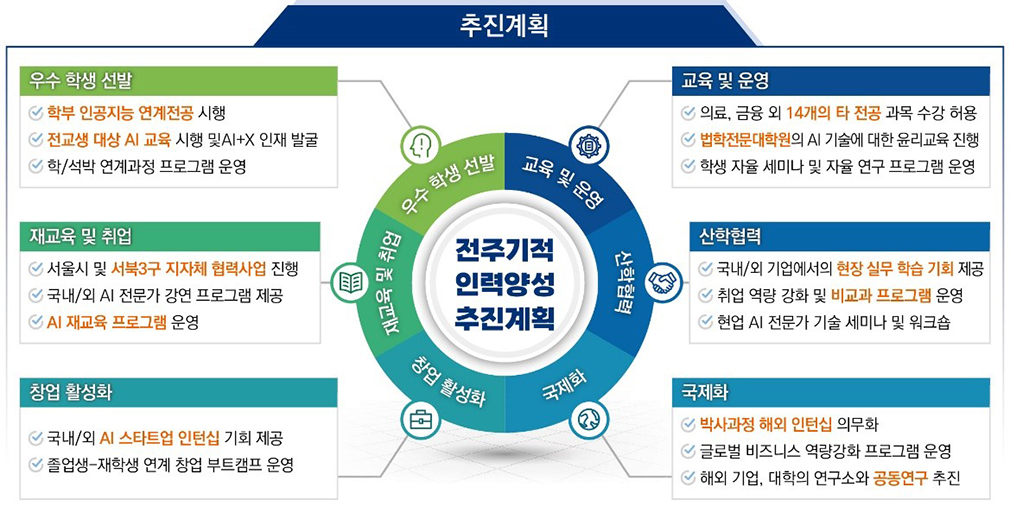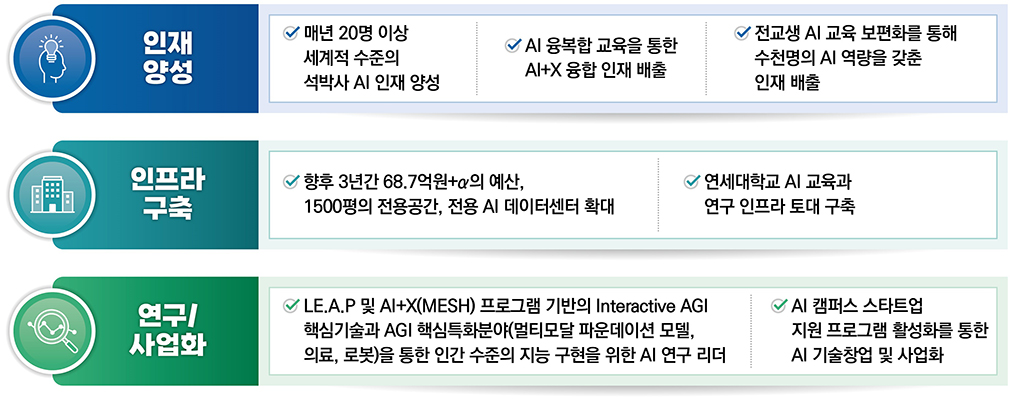Introduction to Yonsei University AI Graduate School Program
Since its establishment on March 1, 2020, the Yonsei Graduate School of AI has been at the forefront of research on core and interdisciplinary technologies that serve as the technical foundation of AI. Its mission is to nurture advanced, interdisciplinary, and entrepreneurial AI talent equipped with a robust software foundation and strong AI core competencies. To achieve this goal, the school has brought together top professors in the field of AI from Korea and abroad, forming a team of 20 participating professors, including 9 full-time faculty members. Furthermore, to leverage the strengths of a comprehensive university, the school focuses on AI+X interdisciplinary education and research programs in fields such as medicine, engineering, business, and humanities. Currently, 30 faculty members from 14 departments are contributing as joint faculty to cultivate well-rounded AI professionals.
Yonsei Graduate School of AI: Vision for Talent Development

- Advanced AI Talent: Professionals equipped with core AI technologies and strong problem-solving abilities
- Interdisciplinary AI Talent: Individuals with ethical responsibility and a comprehensive perspective on AI
- Entrepreneurial AI Talent: Visionaries who proactively address societal challenges using core AI technologies
Under the leadership of the President of Yonsei University, the Yonsei AI Graduate School Program aspires to become a central hub for education and research within the university. To achieve this vision, the school has established a 1,500-pyeong (approximately 4,957 square meters) facility that includes an Open Cooperative AI Research Institute, an AI Data Center, and an AI Education Center. The initiative is advancing systematically through phased objectives, aiming to develop a global AI model that extends AI research and education to local communities, public sectors, industries, and nationwide AI re-education programs.
Support Organization of Yonsei Graduate School of AI

In the first phase (2020–2024), the Yonsei Graduate School of AI has implemented the following strategies to establish an optimized research and education system centered on the LE.A.P program and the MESH program. These strategies aim to achieve comprehensive talent development, foster new business creation and entrepreneurship, and build a world-class AI research hub: (1) Connecting all disciplines to promote comprehensive collaboration in AI education and research, (2) Anticipating industry demands for AI and developing industry-academia programs for talent cultivation and re-education, (3) Establishing systems for education, incubation, and investment to support entrepreneurship, (4) Providing abundant resources for AI education and research, (5) Enhancing the public contribution of AI technologies and expanding AI education for disadvantaged and vulnerable populations.
LE.A.P AI Core Research and AI+MESH Interdisciplinary Research at Yonsei Graduate School of AI

Yonsei Graduate School of AI: Full-Cycle Talent Development Plan

In the second phase (2025–2027), the Yonsei Graduate School of AI will continue to operate and refine the existing LE.A.P program and MESH program. Additionally, it will focus on research and advanced education centered on core technologies for Interactive AGI (Artificial General Intelligence), capable of achieving human-level intelligence, as well as specialized AGI fields such as multimodal foundation models, healthcare, and robotics. To successfully implement the second phase, the school has outlined the following initiatives: (1) Expanding the AI Data Center, (2) Recruiting 23 full-time faculty members for the Graduate School of AI, (3) Establishing a global AI research network, (4) Developing AGI application services and providing support for entrepreneurship.
Yonsei Graduate School of AI: Core Specialization in AGI

In the third phase (2028–2029), the Yonsei Graduate School of AI aims to further advance the LE.A.P program from phase one and the Interactive AGI technologies developed in phase two. At the same time, it plans to expand its research focus to address societal challenges such as climate change, energy, and healthcare, using AI agents. This will involve the development of new curricula, including advanced AI education programs, positioning Yonsei AI as a leader in ushering in the true AI era.
The AI Graduate School Program initiative is structured around three key research focuses: LE.A.P in phase one, Interactive AGI in phase two, and Agentic AI in phase three. Through this progression, the school seeks to lead global research trends, cultivate core talent to drive AI development in Korea, and tackle critical industrial and societal challenges. Phase two emphasizes securing technologies in medical and robotics fields, fostering active industry-academia collaboration models. In phase three, the school will consolidate its research capabilities to address societal issues, such as improving healthcare access for marginalized populations, confronting climate and energy challenges, and advancing medical innovation. These efforts are expected to enhance the quality of life for underserved communities, improve healthcare system efficiency, and reduce costs through innovations in healthcare.
The Yonsei Graduate School of AI aims to contribute to Korea's AI development, one of the nation's 12 core strategic technologies. Its ultimate goal is to narrow the technology gap with the United States, the global leader in AI, and secure a position as the world’s third-leading AI powerhouse. By actively pursuing internationalization, enhancing global research capabilities, and strengthening startup support programs, the school seeks to establish itself as a sustainable hub for AI innovation at Yonsei University, even after the project's conclusion.
Expected Outcomes of the AI Graduate School Program


